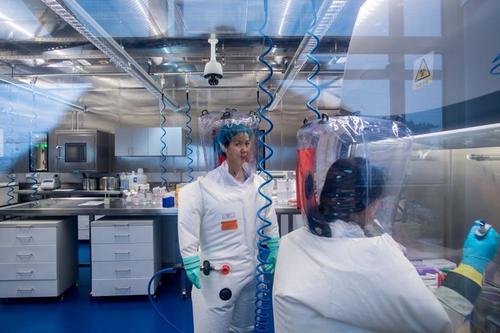Group Of Scientists Insist COVID-19 “Lab Leak” Theory Deserves Further Investigation
As Beijing continues to stonewall international demands to know more about the origins of SARS-CoV-2, the virus that spread COVID-19 throughout the world, more scientists are coming forward to insist that the “lab leak” theory of COVID-19’s origins is credible, and that it will remain so unless Beijing comes forward with more information proving it incorrect.
Regular Zero Hedge readers might remember that we were abruptly banned from Twitter last summer for reporting on the leak “conspiracy theory”. Ultimately, an inaccurate Buzzfeed story claiming we “doxxed” a scientist associated with the Wuhan Institute of Virology – the level 4 biosafety lab that just happens to be situated a mile away from the wet market that was offered up as “ground zero” for the global outbreak – was used to ban us (though our access was reinstituted a few months later, shortly before the MSM embraced the lab leak theory, even reporting that the US intelligence committee is seriously examining the possibility).
Even the international team of scientists sent to “investigate” the origins of the virus has been forced to concede that the leak theory cannot be conclusively debunked, and that it remains credible. In fact, the only thing the WHO team seemingly managed to dig up during their heavily-monitored mission to Wuhan was that the virus originated in bats but likely infected humans via another animal. A “60 Minutes” special recently slammed the WHO report as “curated”, and criticized Beijing for refusing to allow investigators unfettered access to the lab and other areas of interest, while also withholding data on early infections that some believe might harbor signs that the virus started spreading even earlier than officials have claimed.
Now, a group of 18 scientists is insisting that the lab leak theory deserves more attention in a letter to the journal Science:
“More investigation is still needed to determine the origin of the pandemic,” said the 18 scientists, including Ravindra Gupta, a clinical microbiologist at the University of Cambridge, and Jesse Bloom, who studies the evolution of viruses at the Fred Hutchinson Cancer Research Center.
“Theories of accidental release from a lab and zoonotic spillover both remain viable.”
The letter noted that there are several theories about the virus’s origins, and that all credible theories should be taken seriously.
“We must take hypotheses about both natural and laboratory spillovers seriously until we have sufficient data,” the scientists said, adding that an intellectually rigorous and dispassionate investigation needed to take place.
While the WHO team dismissed the lab leak theory as “extremely unlikely,” the scientists wrote that the theory wasn’t given “balanced consideration” with its other theory. In the final report, only 4 of the 313 pages addressed the possibility of a laboratory accident.
It also criticized the WHO and said the investigation into the origins of the virus had not made a “balanced consideration” of the theory that it may have come from a laboratory incident.
Read the full letter below:
On 30 December 2019, the Program for Monitoring Emerging Diseases notified the world about a pneumonia of unknown cause in Wuhan, China (1). Since then, scientists have made remarkable progress in understanding the causative agent, severe acute respiratory syndrome coronavirus 2 (SARS-CoV-2), its transmission, pathogenesis, and mitigation by vaccines, therapeutics, and non-pharmaceutical interventions. Yet more investigation is still needed to determine the origin of the pandemic. Theories of accidental release from a lab and zoonotic spillover both remain viable. Knowing how COVID-19 emerged is critical for informing global strategies to mitigate the risk of future outbreaks.
In May 2020, the World Health Assembly requested that the World Health Organization (WHO) director-general work closely with partners to determine the origins of SARS-CoV-2 (2). In November, the Terms of Reference for a China–WHO joint study were released (3). The information, data, and samples for the study’s first phase were collected and summarized by the Chinese half of the team; the rest of the team built on this analysis. Although there were no findings in clear support of either a natural spillover or a lab accident, the team assessed a zoonotic spillover from an intermediate host as “likely to very likely,” and a laboratory incident as “extremely unlikely” [(4), p. 9]. Furthermore, the two theories were not given balanced consideration. Only 4 of the 313 pages of the report and its annexes addressed the possibility of a laboratory accident (4). Notably, WHO Director-General Tedros Ghebreyesus commented that the report’s consideration of evidence supporting a laboratory accident was insufficient and offered to provide additional resources to fully evaluate the possibility (5).
As scientists with relevant expertise, we agree with the WHO director-general (5), the United States and 13 other countries (6), and the European Union (7) that greater clarity about the origins of this pandemic is necessary and feasible to achieve. We must take hypotheses about both natural and laboratory spillovers seriously until we have sufficient data. A proper investigation should be transparent, objective, data-driven, inclusive of broad expertise, subject to independent oversight, and responsibly managed to minimize the impact of conflicts of interest. Public health agencies and research laboratories alike need to open their records to the public. Investigators should document the veracity and provenance of data from which analyses are conducted and conclusions drawn, so that analyses are reproducible by independent experts.
Finally, in this time of unfortunate anti-Asian sentiment in some countries, we note that at the beginning of the pandemic, it was Chinese doctors, scientists, journalists, and citizens who shared with the world crucial information about the spread of the virus—often at great personal cost (8, 9). We should show the same determination in promoting a dispassionate science-based discourse on this difficult but important issue.
Tyler Durden
Fri, 05/14/2021 – 09:56
via ZeroHedge News https://ift.tt/3onMh6X Tyler Durden
